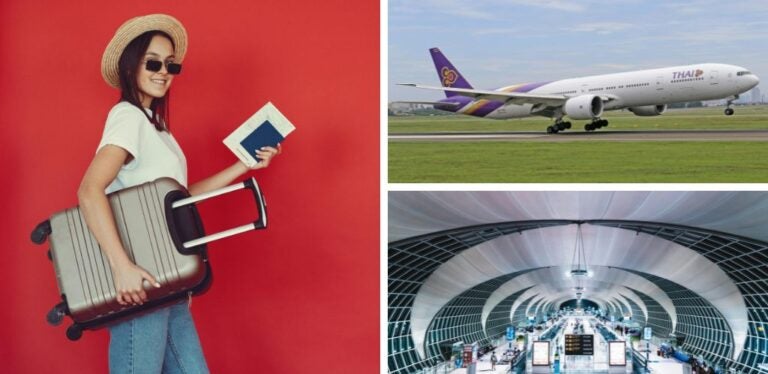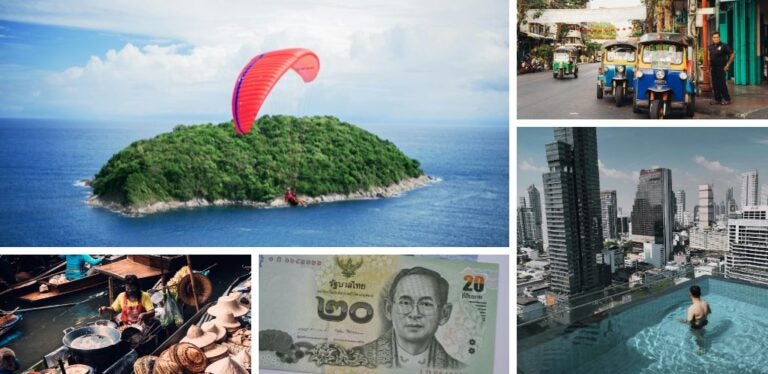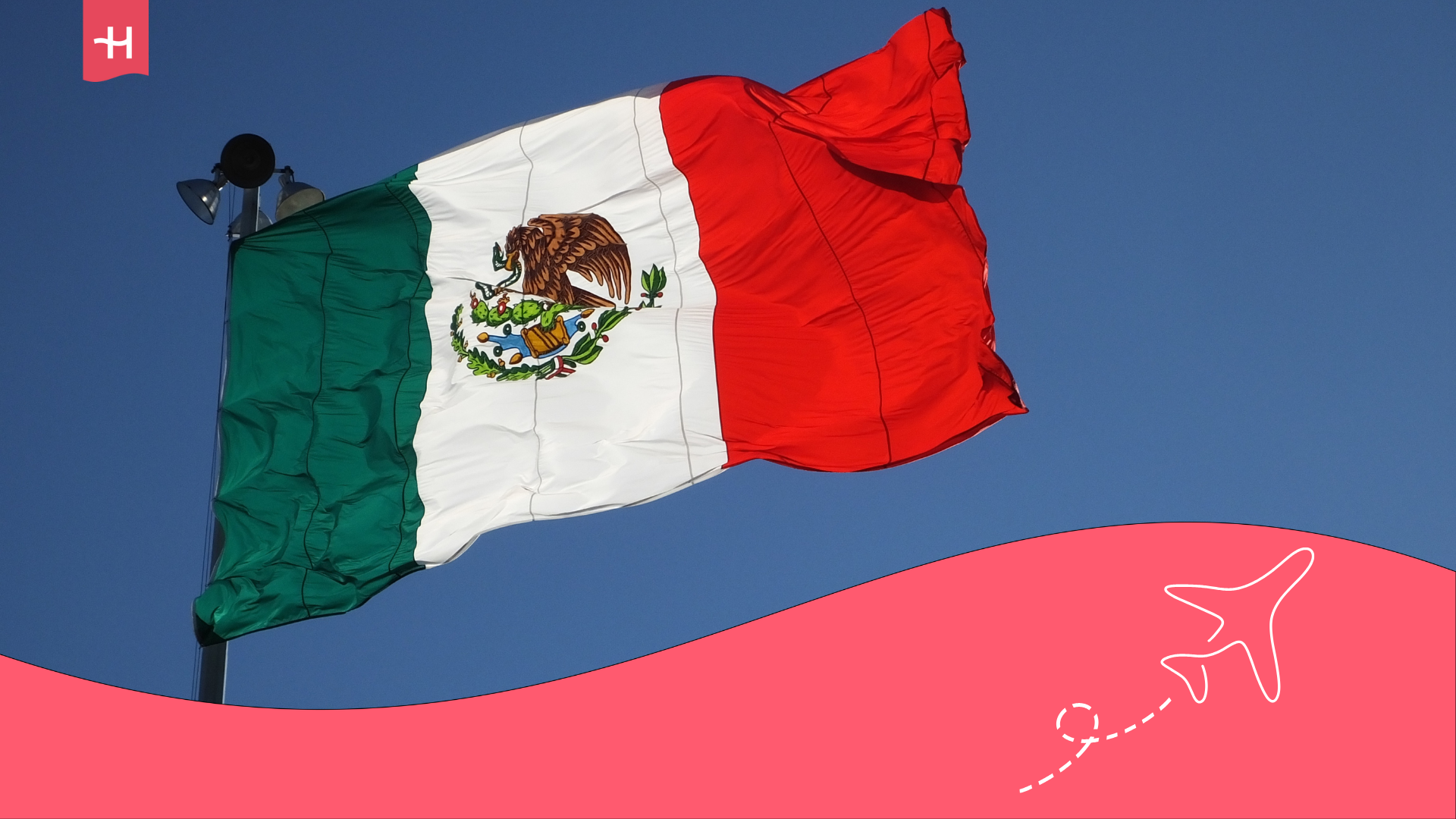Discover the requirements to travel to Thailand from Spain
Discover the requirements to travel to Thailand from Spain in 2025. Do you need a visa or vaccinations? Here is everything you need.
Thailand, known as the “Land of Smiles,” is a top destination for both quick getaways and longer stays. If you’re thinking about hopping on a plane to explore Bangkok, Chiang Mai, or any other part of this beautiful country, there’s one key thing you need to check first: the requirements to travel to Thailand from Spain. To make things easier for you, we’ve put together a guide with everything you need to know.
Thailand isn’t particularly strict when it comes to letting travelers in, but it’s always best to have everything in order to avoid any unexpected issues at immigration. The last thing you want is to be sent back home before even setting foot in the country! In this post, we’ll break down the visa options, any required vaccinations, and some extra tips to help you prepare for your trip.
Some advice before traveling to Thailand
Before we get into the details of the requirements to travel to Thailand from Spain in 2025, here’s a handy tip. While it’s not a must, having internet access from the moment you arrive can save you a lot of trouble. Picture landing in Bangkok and needing to book a Grab (most popular transport app), but the airport WiFi is too slow—or worse, not working. Or finding yourself in Chiang Mai, struggling to communicate an address to a taxi driver. Staying connected will make your trip much smoother.
Planning to explore Thailand for a few days? Then you might want to check out Holafly’s eSIM for Thailand. It gives you unlimited data, activates in minutes, and saves you the hassle of dealing with roaming fees or physical SIM cards. Just pick the number of days you need, and you’ll be connected as soon as you land.
If you’re planning a longer trip to Thailand, Holafly Connect’s global plans might be a better fit. You can choose between 10GB, 25GB, or unlimited data, depending on your needs. Plus, with the 25GB and unlimited plans, you can even share your connection with other devices.
Both options are easy to set up in just a few minutes—even before you leave Spain. That way, you’ll have instant internet access as soon as you arrive in Thailand, without having to rely on airport WiFi or waste time hunting for a local SIM card.
Important: If you are a frequent traveler and want to stay connected without worrying about expensive roaming or looking for a new SIM at every destination, Holafly’s subscription plans are for you. With a single eSIM, enjoy internet in more than 170 countries for a fixed price and no surprises on your bill. travel without limits and connect easily and securely! 🚀🌍

That said, now let’s talk about the requirements to travel to Thailand from Spain in 2025.
1. Airfare to Thailand and back to Spain
Did you know that Thailand may not let you in if you can’t show proof of when you’re leaving? While they don’t always check, arriving without an outbound ticket could lead to extra questioning. In some cases, you might even be required to buy a return flight before being allowed to enter.
This requirement is especially important for travelers entering without a visa. Under the visa exemption program, you can stay in Thailand for up to 60 days. If you don’t have an outbound ticket, immigration might suspect that you intend to overstay your allowed time.
If you are not sure how long you will stay, there are options with free exchanges or refundable rates.
2. Tourist, residence or work visas for Thailand
You can enter Thailand without a visa, but keep in mind that you can only stay for 60 days from your arrival. They’re quite strict about this, and overstaying can lead to fines. If needed, you can extend your stay for another 30 days at an immigration office, but this is only allowed once.
If you’re planning to stay longer, you’ll need to get a visa. This is a must if you’re planning to live, study, or work in Thailand. Let’s go over the main types of visas you should know about:
2. 1. Non-immigrant visa “ED” (studies)
If you’re traveling to study Thai, take university courses, or join an exchange program, you’ll need a student visa (Non-Immigrant ED). To apply, you’ll need to provide an acceptance letter from the educational institution and prove you have the financial means to support yourself.
2. 2. Non-immigrant visa “B” (work)
Working in Thailand without the proper visa can get you into serious trouble. If you have a job offer, the Non-Immigrant B visa is the most common choice, but you’ll need to apply for it before you arrive. You’ll also have to get a work permit, as you can’t legally work without it.
2. 3. Non-immigrant visa “O-A” (retirement)
Working in Thailand without the proper visa can get you into serious trouble. If you have a job offer, the Non-Immigrant B visa is the most common choice, but you’ll need to apply for it before you arrive. You’ll also have to get a work permit, as you can’t legally work without it.
If you’re planning to stay in Thailand for more than a month, make sure to get the proper visa ahead of time. Without it, you might run into trouble at immigration or even be denied entry. The good news is, since November 2022, you can complete the entire process online.
3. Passport to travel to Thailand
A key requirement for entering Thailand is having a passport that’s valid for at least six months from your arrival date. If your passport expires before then, you might not be allowed to board your flight or could face problems at immigration.
If you’re traveling with children, check if they need any additional paperwork. In certain situations, if they’re not accompanied by both parents, you may be required to provide a signed authorization. It’s not common, but it’s best to have everything sorted to avoid any issues at immigration.

4. Address of the place of accommodation in Thailand
While it’s not always a mandatory requirement, immigration may ask you to show proof of where you’ll be staying during your time in Thailand. This is because Thai authorities want to ensure travelers have a clear plan and aren’t intending to overstay or stay without proper documentation.
If you’re staying in a hotel, hostel, Airbnb, or coliving space, be sure to have your reservation details on hand. If you’re staying with friends or family, it’s best to bring an invitation letter that includes their address and contact information.
They don’t always ask for it, but if they do and you’re unprepared, it could lead to more questions and delay your entry. Having this info ready can help you avoid delays and make the immigration process smoother.
5. Passing immigration control in Thailand
Now we’ve reached the key moment: going through immigration at the airport. While Thailand sees millions of tourists every year, the authorities may ask a few questions to confirm that your visit is genuine.
What can they ask you?
- What is the reason for your trip?
- How long do you plan to stay in Thailand?
- Where will you stay?
- Do you have enough money for your stay?
Answer confidently and without hesitation. If you have your return ticket, accommodation confirmation, and proof of financial means with you, the process will go much smoother. You don’t need to carry large amounts of cash, but you should be able to show that you can afford your trip.
If everything is in order, the officer will stamp your passport with the date of entry and that’s it.
6. Medical insurance when traveling to Thailand
It’s not required but advisable. Traveling without good insurance can end up being expensive. Despite the low cost of living, private healthcare in Thailand can be pricey for foreigners. Having insurance ensures you’ll have access to quality medical care no matter where you are in Thailand.
It’s highly recommended to have travel insurance with good medical coverage (at least 30,000 euros / $33,000). If you’re staying in Thailand for a longer period, you might want to explore health insurance options for foreigners, as some plans cover routine visits, not just emergencies. A solid insurance plan can save you a lot of money if you ever need medical care.

Other tips for traveling to Thailand
With those six points, we’ve covered the main requirements to travel to Thailand from Spain. However, there are a few extra things that, while not essential, can make a big difference in your trip. These are the things that will make your life easier, and it’s better to sort them out before you get on the plane. What else is worth keeping in mind?
1. Travel insurance for Thailand
As mentioned, having medical or travel insurance isn’t a requirement. However, not having it can be a serious mistake. While healthcare in Thailand is generally more affordable compared to other countries, if something goes wrong and you need private hospital care, the costs can escalate quickly. A doctor’s visit at a private clinic can cost anywhere from 50 to 100 euros ($54 to $108), and a hospital stay might exceed 1,000 euros ($1,080) per day. And that’s not even counting the high cost of medical repatriation.
In addition to medical coverage, a good travel insurance policy for Thailand will protect you against theft, flight cancellations, lost luggage, and other unexpected issues that can arise during your trip. If you plan on doing activities like diving, hiking, or riding a motorbike in Phuket, make sure your policy covers adventure sports.
2. Driving license in Thailand
Many travelers choose to rent motorcycles or cars to explore the cities and islands in Thailand. If you plan to do the same, be aware that your Spanish driver’s license alone won’t cut it. You’ll need an International Driving Permit (IDP) to drive in Thailand. Without it, you might get fined if you’re pulled over by the police.
Rental agencies might not ask for it when you pick up the vehicle, but the police could request it during a checkpoint. Also, if you’re involved in an accident without the permit, your insurance may refuse to cover medical costs and damages to others.
If you’re staying in Thailand for an extended period and plan to be there for more than three months, you’ll need to get a Thai driver’s license. For shorter stays, it’s best to arrange an international driving permit before you leave Spain.

3. Cards, cash and payment options in Thailand
Cash is still the preferred payment method in many parts of Thailand. While you can use cards in places like hotels, shopping malls, and tourist restaurants in big cities like Bangkok, smaller shops, local markets, and street food vendors typically only accept cash.
To avoid any issues, it’s a good idea to have around 3,000 to 5,000 Thai baht ($82 to $138) on hand when you arrive. This will cover taxis, meals, and other small expenses without having to hunt for an ATM right away.
If you plan to use your Spanish cards, check with your bank about the foreign exchange fees they charge. Many banks add a 3-5% fee for purchases in Thai baht. A smart way to avoid these extra costs is to use cards that don’t charge foreign transaction fees, like Revolut, N26, or Wise.
If you’re staying long-term, opening a Thai bank account can simplify everyday transactions and save you from currency exchange fees. Some of the most commonly used banks by expats and digital nomads in Thailand are Kasikornbank, Bangkok Bank, and SCB.
4. Mandatory vaccinations for travel to Thailand
One of the most common questions from Spaniards traveling to Thailand is whether any vaccinations are required to enter. The answer is no, there are no mandatory vaccines. However, some are strongly recommended, especially if you plan to visit rural areas or travel during the rainy season.
Among the most recommended are:
- Hepatitis A and B
- Typhoid fever
- Tetanus and diphtheria
- Rabies (if you plan to be in contact with animals)
- Japanese encephalitis (if you go to rural areas during the rainy season).
If you’ve been to a country with a risk of yellow fever, you may be asked for a vaccination certificate. Before traveling, it’s a good idea to visit an international vaccination center to make sure you’re properly protected.
Frequently asked questions on requirements for travel to Thailand from Spain
If you’re visiting for less than 60 days as a tourist, you don’t need a visa. For longer stays or if you’re traveling for work or study, you’ll need to get a specific visa before you go.
Spaniards can stay in Thailand for up to 60 days without a visa, as long as they have a return ticket within that period. If you want to stay longer, you can apply for a 30-day extension at an immigration office or get a visa before your trip.
Sometimes they may ask for a return ticket to confirm that you don’t intend to stay longer than permitted. It’s best to have it either printed or in digital form, just in case they request it at immigration.
While it’s not a requirement, having insurance is highly recommended. Medical care in private hospitals can be expensive, and without insurance, you could end up with high bills if you need treatment. Plus, it ensures you’ll have access to quality healthcare, even in more remote areas.
There are no mandatory vaccines, but it’s recommended to be up to date on typhoid, hepatitis A and B, and yellow fever if you’ve been to at-risk areas. For more details, it’s a good idea to visit an International Vaccination Center before your trip.
You’ll need an International Driving Permit as well. Without it, you could face fines, and your insurance may not cover you if you’re involved in an accident. For longer stays, it’s a good idea to get a Thai driver’s license.





 Language
Language 


















 No results found
No results found







